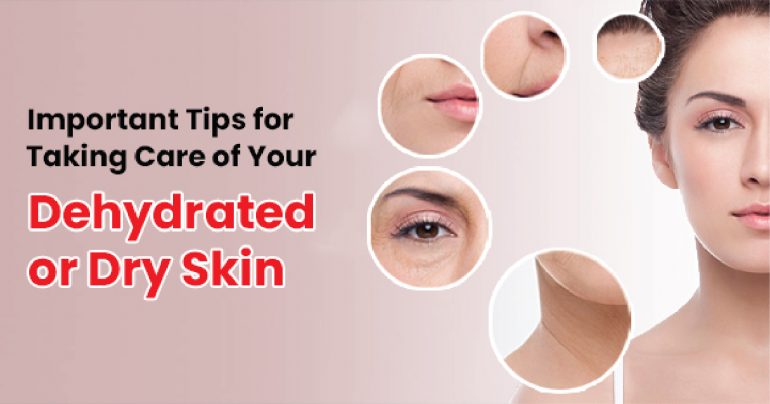When our skin is uncomfortable, starts to flake, we tend to take the fastest route to a diagnosis: I have dry skin, and I will treat it as such. But did you know that there is a huge difference between dry and dehydrated skin? The latter is a much more common problem and is usually more of a temporary situation. Let’s take a closer look at this particular beauty problem.
Do Not Confuse Dehydrated with Dry Skin

Dry skin is a skin type, a genetic characteristic that we can’t modify. We can certainly improve the quality of our epidermis but can’t modify the quality of the lipids produced by our skin. Dehydration, on the other hand, is a temporary state, a skin condition linked to external factors such as the cold, the sun, stress, or a skincare routine that is too harsh. And the good news? You can improve the skin’s hydration levels.
Hungry or Thirsty Skin?
Dry skin is skin that is lacking in oil. While dehydrated skin lacks water, that is the simple rule of thumb. And to be in the best possible form, your complexion needs the right balance of water and oil. But things often become complicated when we try to diagnose the problem: does my skin need a big glass of water or a hearty dose of oil? Let’s take a look in the mirror.
Characteristics of Dry Skin
It is a skin that plays thrifty because it does not produce enough fat. We all have a protective barrier (the famous hydrolipidic film), which, when it is altered or even non-existent for dry skin, also leads to water loss. As a result, you can have dry skin that also suffers from dehydration! To defend themselves, dry skins can also thicken which is a natural phenomenon linked to their need to make up for the thinning or non-existent barrier.
I have dry skin if:
- Since I was small, I have always complained that my skin was tight.
- I’m lucky and have almost invisible pores.
- My complexion is often dull.
- My skin is fine, rough and rarely feels soft?
- I dread the winter as I always have dry patches.
Characteristics of Dehydrated skin

Although dehydrated skin is often inextricably linked to dry skin as the barrier layer has been altered (think strong air conditioning, smoking, too much alcohol, stress, pollution, or certain medicines), leading to a loss of water, a bit like a leak.
I have dehydrated skin if:
- My skin feels uncomfortable in certain areas (often the cheeks), and the rest of my complexion can be shiny, especially in the T-zone.
- My pores are dilated in certain areas.
- My skin often feels tight after cleansing or when I am outside.
How to Look After Dry Skin
The Dos:
- Rebuild the barrier layer with an oily serum, which protects the skin from external aggressions and blocks water loss.
- Use a nourishing cream that really envelops the skin. It will also help if your skin is more mature as the passing of time can also make the skin dryer.
- Dry skin can easily suffer from blemishes, a real problem if you look for a product that can solve both issues.
- Recharge the skin’s batteries by applying a mask twice a week. It will nourish and soften the skin and help to make the complexion prettier and brighter.
How to Look After Dehydrated Skin
The Dos
- Every night, we double cleanse with soft, non-aggressive products such as the Light Work. It will remove oil and impurities such as make-up and pollution. At the same time, the cleanser will give you really clean skin while also calming and commencing the hydration process.
- When you have dehydrated skin, you often don’t dare to exfoliate it. This is a mistake as it is often the best way to get rid of dead skin cells, thereby improving the deep penetration of hydrating ingredients. You can exfoliate as often as you like with products that suit even the most sensitive of skins.
- You can rely on a good skincare product to help rebuild the protective layer on the skin’s surface while still allowing it to breathe. This product should contain mini-capsules of hyaluronic acid, which help to boost the skin’s moisture levels to keep it well hydrated.
- One of the best tips for providing immediate relief from dryness and getting rid of that ‘creased’ look is a hydrating mask. Choose a multi-tasking product, which hydrates and also helps to remove impurities and make the complexion clearer. Such masks are ideal for sensitive skin types that suffer from occasional blemishes.
The DON’Ts – Whether You Have Dry or Dehydrated Skin
- Turn down the central heating and the air-conditioning and avoid pollution wherever possible!
- Avoid showers or baths that are too hot as they melt the hydrolipidic barrier.
- Help to maintain the surface layer of the skin by not washing your skin every morning. Instead, try a lotion.
- Stop using products that contain denatured alcohol, which dries the skin. Instead, use products containing skincare ingredients, which uses hydrating aloe vera as its base ingredient.









